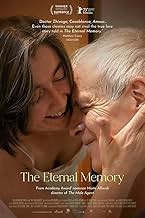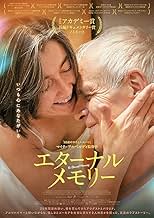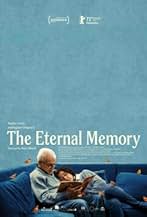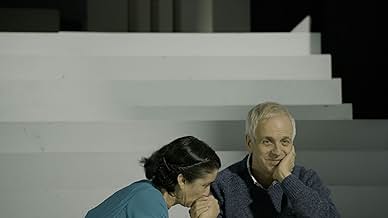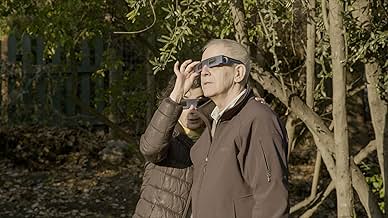VALUTAZIONE IMDb
7,4/10
3899
LA TUA VALUTAZIONE
Augusto e Paulina stanno insieme da 25 anni. Otto anni fa, a lui è stato diagnosticato il morbo di Alzheimer. Entrambi temono il giorno in cui non la riconoscerà più.Augusto e Paulina stanno insieme da 25 anni. Otto anni fa, a lui è stato diagnosticato il morbo di Alzheimer. Entrambi temono il giorno in cui non la riconoscerà più.Augusto e Paulina stanno insieme da 25 anni. Otto anni fa, a lui è stato diagnosticato il morbo di Alzheimer. Entrambi temono il giorno in cui non la riconoscerà più.
- Candidato a 1 Oscar
- 14 vittorie e 27 candidature totali
Gustavo Cerati
- Self
- (filmato d'archivio)
Pedro Lemebel
- Self
- (filmato d'archivio)
Javier Bardem
- Self
- (filmato d'archivio)
- (non citato nei titoli originali)
Recensioni in evidenza
Watching this film I realised what it means to love a person to pieces. Augusto and Paulina have been together for 25 years. Augusto has been diagnosed with Alzheimer's disease and the day is not far when he'll stop recognising her. Covid lockdown makes it worse for the couple because they are cut off from friends and his condition worsens much more quickly because of the isolation. The film uses archival footage to show glimpses from their past. Paulina is much younger to Augusto Góngora, a prominent journalist from when Pinochet was in power. She is the minister of Culture. He's also very popular amongst his friends. Paulina sticks by his side as his condition fails. It's these scenes that are really touching, her dedication and commitment even as he's drifting into the darkness. It's the memory of love that sustains them, and it's this memory which is eternal, even as the physical body deteriorates. Kudos to Maite Alberdi for making this great love story.
In The Eternal Memory, there is a strong emotional charge from the first moment, which is maintained until the last seconds. This is the hook for the general audience, since emotionality is associated with relatable events. My biggest problem with this documentary is that the story loses its direction in monotony, falling into a plot dead end from which it cannot escape. It seems more like a video diary of the progression of one of the protagonists' illness, which also doesn't quite work, since there are inexplicable time jumps and events that remain unmentioned.
The documentary only relies on its high emotionality to attract an audience and there is nothing more to tell.
It's not completely flat and boring, but I would recommend other works alluding to the topic in question, such as the films Still Alice or The Father.
The documentary only relies on its high emotionality to attract an audience and there is nothing more to tell.
It's not completely flat and boring, but I would recommend other works alluding to the topic in question, such as the films Still Alice or The Father.
Saw this at the 2023 Sundance Film Festival
"The Eternal Memory" is a story about Augusto and Paulina have been together for 25 years. Eight years ago, he was diagnosed with Alzheimer's disease. Both fear the day he no longer recognizes her. The film was one of the best documentaries from this years festival as the film was able to capture the relationship between the couple with heartwarming sequences. Director Maite Alberdi was able to perfectly capture life of having Alzheimer's disease and was able to make the characters very interesting to observe. Alzheimer's disease is a disease that is difficult to cure and it's interesting to see a story revolving around a real couple going through this process and seeing how they are able to resolve their conflicts.
Many archival footages used to describe the setting and situations were purposeful and well informative. Many of the dialogue moments were very interesting as it was very fun to observe and listen to the two main lead characters to talk about their lives and love. Along with other participants, there are some many interesting conversations provided and the tone goes from sometimes comedic and touching at the same time. From someone who has a relative who suffers from Alzheimer's disease, the film does hit home pretty hard.
Overall, it's a great documentary and it's one of the best at Sundance.
Rating: A-
"The Eternal Memory" is a story about Augusto and Paulina have been together for 25 years. Eight years ago, he was diagnosed with Alzheimer's disease. Both fear the day he no longer recognizes her. The film was one of the best documentaries from this years festival as the film was able to capture the relationship between the couple with heartwarming sequences. Director Maite Alberdi was able to perfectly capture life of having Alzheimer's disease and was able to make the characters very interesting to observe. Alzheimer's disease is a disease that is difficult to cure and it's interesting to see a story revolving around a real couple going through this process and seeing how they are able to resolve their conflicts.
Many archival footages used to describe the setting and situations were purposeful and well informative. Many of the dialogue moments were very interesting as it was very fun to observe and listen to the two main lead characters to talk about their lives and love. Along with other participants, there are some many interesting conversations provided and the tone goes from sometimes comedic and touching at the same time. From someone who has a relative who suffers from Alzheimer's disease, the film does hit home pretty hard.
Overall, it's a great documentary and it's one of the best at Sundance.
Rating: A-
It's a documentary about a Chilean couple whose younger wife supports her husband, who has Alzheimer's.
Augusto Góngora was a prominent journalist and later cultural commentator on Chilean Public Television, beginning with the Pinochet years and following. He has two children; the documentary says nothing about his first wife. He has been in a relationship with actress Paulina Urrutia since 1997; they married in about 2017, several years after Góngora was diagnosed with Alzheimer's.
The documentary follows their interaction, especially during COVID-19, together with flashbacks to home movies and television clips from happier times when Góngora was practicing his profession. One of Góngora's post-Pinochet books reflected on cultural memories related to those difficult years. The documentary fashions a philosophical connection between the earlier cultural memory and the tragedy of Góngora's memory loss.
"The Eternal Memory" is a very personal movie. At first, I wondered if it was contrived reality TV, given the amiable manner in which the film initially portrays Góngora. But later, his confusion and increasing anxiety are plainly depicted. I'm not sure the memory linkage between Góngora's earlier professional life and later personal state is effective. But the film is gripping and is a challenging watch for people personally connected to someone with Alzheimer's Disease.
Augusto Góngora was a prominent journalist and later cultural commentator on Chilean Public Television, beginning with the Pinochet years and following. He has two children; the documentary says nothing about his first wife. He has been in a relationship with actress Paulina Urrutia since 1997; they married in about 2017, several years after Góngora was diagnosed with Alzheimer's.
The documentary follows their interaction, especially during COVID-19, together with flashbacks to home movies and television clips from happier times when Góngora was practicing his profession. One of Góngora's post-Pinochet books reflected on cultural memories related to those difficult years. The documentary fashions a philosophical connection between the earlier cultural memory and the tragedy of Góngora's memory loss.
"The Eternal Memory" is a very personal movie. At first, I wondered if it was contrived reality TV, given the amiable manner in which the film initially portrays Góngora. But later, his confusion and increasing anxiety are plainly depicted. I'm not sure the memory linkage between Góngora's earlier professional life and later personal state is effective. But the film is gripping and is a challenging watch for people personally connected to someone with Alzheimer's Disease.
Greetings again from the darkness. Augusto and Paulina are a real couple facing real challenges in the real world. Their challenges aren't related to where to head for dinner or whether Augusto will leave the toilet seat up or down. No, their daily challenges are whether Augusto will wake up and recognize his wife, or even know his own name. Chilean Documentarian Maite Alberti climbs inside this relationship to show us the real impact of Alzheimer's Disease, and does so expertly and intimately.
Augusto Gongora was a professional News Reporter/Journalist during the Pinochet regime, and Paulina Urrutia was a successful actor ... both well known in their country. We even see clips and archival newsreels of Augusto's work. However, filmed during COVID, almost the entirety of the film is focused on these two people taking each day as it comes ... the good days and the not-so-good days. And perhaps 'moments' is a better measure than days, as this cruel disease can shift quickly. Paulina handled much of the camera work so the director and crew could keep safe distance during the pandemic, and the result is a few blurry shots, none of which detract from what we are meant to see.
Paulina helps Augusto with his memory of work and kids. She helps him take a shower. She reads to him when they take walks, and she cringes as he rides a bicycle. She helps him with his eye protection as they view the eclipse. They even treasure the time they can dance together. There are many times they share a laugh, and there are times Paulina cries alone or Augusto appears lost. Mostly they have their tender moments which define the relationship that they so want to hold on to ... all while surrounded by Augusto's lifelong collection of books that fill the house - most of which he can no longer read.
Theirs is a love story. And it's real.
Augusto Gongora was a professional News Reporter/Journalist during the Pinochet regime, and Paulina Urrutia was a successful actor ... both well known in their country. We even see clips and archival newsreels of Augusto's work. However, filmed during COVID, almost the entirety of the film is focused on these two people taking each day as it comes ... the good days and the not-so-good days. And perhaps 'moments' is a better measure than days, as this cruel disease can shift quickly. Paulina handled much of the camera work so the director and crew could keep safe distance during the pandemic, and the result is a few blurry shots, none of which detract from what we are meant to see.
Paulina helps Augusto with his memory of work and kids. She helps him take a shower. She reads to him when they take walks, and she cringes as he rides a bicycle. She helps him with his eye protection as they view the eclipse. They even treasure the time they can dance together. There are many times they share a laugh, and there are times Paulina cries alone or Augusto appears lost. Mostly they have their tender moments which define the relationship that they so want to hold on to ... all while surrounded by Augusto's lifelong collection of books that fill the house - most of which he can no longer read.
Theirs is a love story. And it's real.
Lo sapevi?
- QuizAugusto Góngora, used to be the host in the Chilean broadcasts of the Academy Awards. Now, the story of his struggle with Alzheimer's is nominated for the Academy award for best documentary feature.
- Citazioni
Augusto Góngora: I want to see my friends and something strange is happening here.
- ConnessioniFeatured in The Oscars (2024)
- Colonne sonoreA Dónde Van
Written, composed and performed by Silvio Rodríguez
I più visti
Accedi per valutare e creare un elenco di titoli salvati per ottenere consigli personalizzati
- How long is The Eternal Memory?Powered by Alexa
Dettagli
Botteghino
- Lordo Stati Uniti e Canada
- 67.594 USD
- Lordo in tutto il mondo
- 118.866 USD
- Tempo di esecuzione
- 1h 25min(85 min)
- Colore
- Mix di suoni
- Proporzioni
- 1.85 : 1
Contribuisci a questa pagina
Suggerisci una modifica o aggiungi i contenuti mancanti

![Guarda Trailer[OV]](https://m.media-amazon.com/images/M/MV5BYzMzYTU5NTItNDYxZC00NzUzLWJjMTktZDg4YjkwNzY5ZmEwXkEyXkFqcGdeQXRyYW5zY29kZS13b3JrZmxvdw@@._V1_QL75_UX500_CR0)

